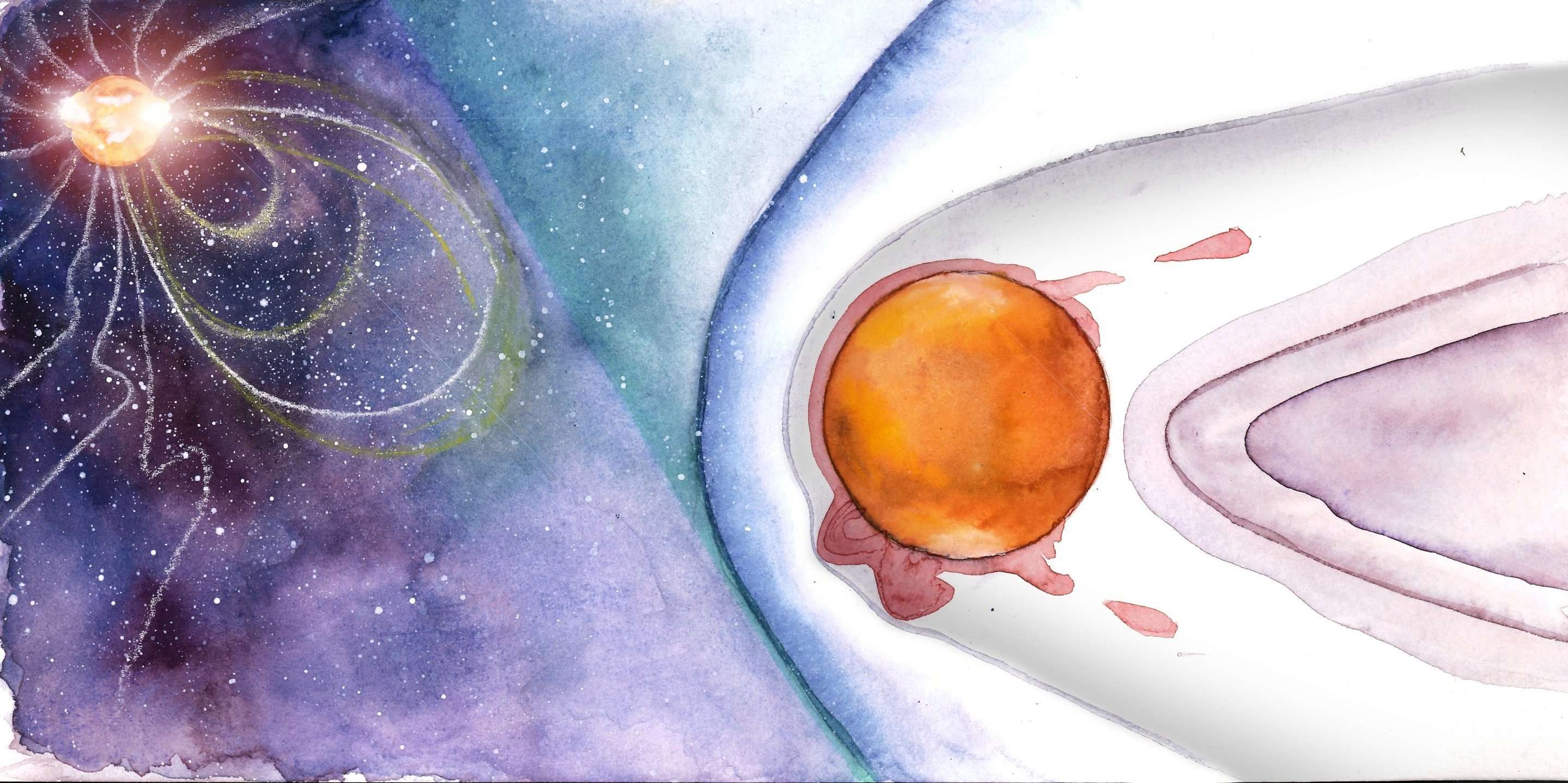Charged particles from the sun (the solar wind) form an induced magnetosphere round Mars, which unlike the sun does not have its own intrinsic magnetic field. Credit: Anastasia Grigoryeva Despite the absence of a global Earth-like magnetic dipole, the Martian atmosphere is well protected from the effects of the solar wind on ion escape from the planet. New research shows this using measurements from the Swedish particle instrument ASPERA-3 on the Mars Express spacecraft. The results have recently been presented in a doctoral thesis by Robin Ramstad, Swedish Institute of Space Physics and Umeå University, Sweden.
Present-day Mars is a cold and dry planet with less than 1 percent of Earth's atmospheric pressure at the surface. However, many geological features indicate the planet had an active hydrological cycle about 3 to 4 billion years ago. An active hydrological cycle would have required a warmer climate in the planet's early history and therefore a thicker atmosphere, one capable of creating a strong greenhouse effect.
A common hypothesis maintains that the solar wind over time has eroded the early Martian atmosphere, causing the greenhouse effect, and thus the hydrological cycle, to collapse. Unlike Earth, Mars has no global magnetic dipole, but the solar wind instead induces currents in the ionized upper atmosphere (the ionosphere), creating an induced magnetosphere.
"It has long been thought that this induced magnetosphere is insufficient to protect the Martian atmosphere," says Robin Ramstad. "However, our measurements show something different."
The Swedish-led ion mass analyser on Mars Express has been measuring the ion escape from Mars since 2004. In his research, Robin Ramstad has combined and compared measurements of the ion escape under varying solar wind conditions and levels of ionizing solar radiation, so-called extreme ultraviolet (EUV) radiation. The results show that the solar wind has a comparatively small effect on the ion escape rate, which instead mainly depends on the EUV radiation. This has a large effect on estimations of the total amount of atmosphere that has escaped to space.
"Despite stronger solar wind and EUV-radiation levels under the early Sun, ion escape can not explain more than 0.006 bar of atmospheric pressure lost over the course of 3.9 billion years," says Robin Ramstad. "Even our upper estimate, 0.01 bar, is an insignificant amount in comparison to the atmosphere required to maintain a sufficiently strong greenhouse effect, about 1 bar or more according to climate models."
The results presented in the thesis show that a stronger solar wind mainly accelerates particles already escaping the planet's gravity, but does not increase the ion escape rate. Contrary to previous assumptions, the induced magnetosphere is also shown to protect the bulk of the Martian ionosphere from solar wind energy transfer.
Explore further: MAVEN mission finds Mars has a twisted tail

Pluto_and_Charon on December 9th, 2017 at 14:13 UTC »
This is why we do science. I remember back when MAVEN launched a lot of people on reddit were like "Why do we need to send a spacecraft to confirm that Mars's atmosphere is being eroded away by solar wind? I was taught this back in uni 20 years ago!"
Clearly this result from Mars Express shows there's a lot about planetary atmospheric science that we don't know. Never accept a hypothesis as fact, no matter how widespread it is.
adzman on December 9th, 2017 at 13:43 UTC »
But is the Martian atmosphere well protected from solar winds?
the_original_Retro on December 9th, 2017 at 13:13 UTC »
This article focuses on the reasons why the solar wind hasn't eroded the Martian atmosphere, but it makes me wonder what difference that would make for early human visitors.
Does this have any implications for reducing radiation levels at the planet's surface? Would this increase the safe time that a reasonably mobile personal Mars suit would provide when visiting humans are required to work in person on the surface?
It's likely that there'd be a lot of "outside" activity involved in setting up early permanent colonies as there's only so much that telepresence and robotics can do... at least at this time, anyway.
[edit: grammar tidy-up]